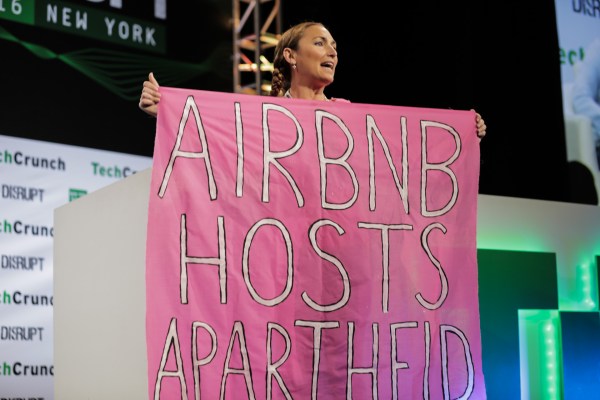Airbnb is under fire for allowing hosts on its platform to list homes in Israel’s occupied territories. And today the issue became the subject of a protest at the TechCrunch Disrupt conference in New York, after one of its board members took the stage for an interview. Sequoia’s Alfred Lin was interrupted by a protester brandishing a banner with the words “Airbnb hosts apartheid.”
The issue of occupied territory and Israeli settlements is a messy one, and Airbnb’s place in it is also complicated.
Critics have been hitting out at the disputed listings for two main reasons. First, Airbnb and homeowners are profiting by renting out homes in a politically disputed region. And second, there are claims that the hosts are regularly refusing to rent properties to guests with Arabic-sounding names. (One investigation published here claimed several violations of this kind.)
The individual who stormed the stage, Ariel Gold from the group CodePink (a persistent critic of the company), was removed by security and arrested for trespassing, after it emerged that she gained access to the stage by going through Port Authority territory at the Brooklyn Cruise Terminal, where Disrupt is taking place.
She was released shortly after the arrest, she told me in an interview later. There was also a small group of protesters outside the event who were also from CodePink along with another group, the Stolen Homes coalition.
“Our goal was to ensure that conference goers were aware that Airbnb lists homes in illegal settlements built on Palestinian land, and that there is a constituency of human rights activists, including Jewish Americans, that are asking Airbnb to withdraw from the settlements,” Naomi Dann, another protester, told me.
“According to a recent report by Human Rights Watch, Airbnb, along with other companies that operate in the illegal settlements, has a responsibility to end its complicity in the settlement economy. Failure to do so indicates a tacit endorsement of policies and practices that displace Palestinians, and enables Israel’s incremental annexation of the West Bank,” she added.
Airbnb has been fighting fires on the regulatory front around the issue of “illegal” hosts — that is, those that do not meet local regulations for running accommodation businesses. It’s also not a stranger to staying out of certain markets when barred by U.S. sanctions. For example, it was only recently that Airbnb fully opened for business in Cuba, part of a wider thaw of the U.S. trade embargo with the country.
But more generally, the company — which has raised over $2.5 billion and is valued at over $25 billion — is also trying to find ways to continue to grow globally, not shrink.
The occupied territories in Palestine/Israel are an interesting point of reference in that context. The settlements in Palestine/Israel are considered by some to be in contravention of the Fourth Geneva Convention; but even that is in dispute, since Israel (unsurprisingly) does not agree.
Airbnb has somewhat adopted the position of an innocent bystander in the debate.
“We care deeply about the feedback we receive from our community and we take these issues incredibly seriously,” it told the SF Chronicle in March. “This particular issue is complex: people have been debating this matter for 5,000 years, so a hospitality company from San Francisco isn’t going to have all the answers but at the end of the day, we want to help open the world, not close it off.”
But could that change?
We’ve heard from sources that the company is considering how it might pull certain listings from the region. But the statement that the company has provided to us does not address that specifically: it focuses instead on how it follows laws on where it can do business, it said, adding: “We investigate specific concerns raised about listings and/or discrimination.”
Airbnb’s business in occupied territories came to light earlier this year, when it was revealed that there were dozens of listings in these areas, which Israel claims as part of their country but other countries dispute. Here is an example of one. Overall, there are hundreds of properties listed in Israel on the platform.
Airbnb’s full statement:
We believe in the transformative power of allowing people to share experiences that can come from sharing a home. That’s why Airbnb is an open platform with hosts and guests in 191 countries around the world. We follow laws on where we can do business and we investigate specific concerns raised about listings and/or discrimination.
Airbnb is based on trust and we depend on hosts and guests to be transparent with one another. Hosts determine how their listing is described and we urge all hosts to provide accurate information about where their listing is located so guests know what to expect. We also encourage guests to communicate with their host about their listing long before a trip begins.
Following a stay at an Airbnb listing, hosts and guests rate one another and hold each other accountable. Guests can leave detailed feedback that is available to the public, including information about where the listing is located and whether it was accurately described by the host.
